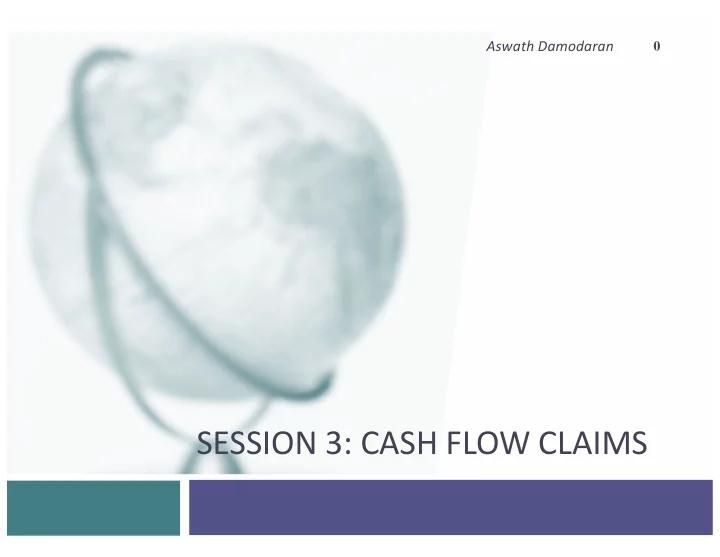

Aswath Damodaran 0 SESSION 3: CASH FLOW CLAIMS
Cash Flows versus Earnings ¨ When asked to assess the financial health of a company, we almost invariably look at the accounting bottom line, i.e., earnings. ¨ There are two reasons why accounting earnings can be very different from cash flows: ¤ Accrual accounting requires you to report transactions as they happen, not as you get paid or pay your suppliers. ¤ Accounting classifies expenses into operating, capital and financing expenses. Operating and financing expenses are deducted from revenues to get to earnings but capital expenses are spread over time (as depreciation or amortization) 1
To get from earnings to cash flows 2 ¨ There are three steps in getting from accounting earnings to cash flows in a specific period: ¤ Add back any accounting expenses that are non-cash (like depreciation) ¤ Subtract out the capital expenses in that period ¤ Subtract out the change in non-cash working capital during that period ¨ The resulting cash flow can be much higher, close to or much lower than the earnings. ¨ When the two disagree, you go with the cash flows. Aswath Damodaran 2
Types of Cash Flows • Contractually set cash flows: These are cash flows set at the time a contract is initiated. They are sometimes a constant and sometimes tied to an mutually agreed upon scalar. • Residual cash flows: Cash flows left over after contractual obligations have been met. • Contingent cash flows: Cash flows that will occur only in if a specified event occurs/ 3
Contractual Cash Flow Claims ¨ Constant: The easiest and most common example is a fixed rate bank loan or a corporate bond, where the interest payment or coupon is set up front, with the added liability that the principal will have to be paid either over the life of the loan (term bank loan) or at the end of its life (balloon payment). ¨ Variable: In a variable contractual commitment, the terms of the commitment are set up front but the amount will vary, depending upon a specified variable. ¤ In a floating rate loan, the interest payment each period will be linked to an observable interest rate (LIBOR, T.Bond Rate) ¤ In a commodity loan, the interest payment may be tied to the price of a commodity. 4
Residual Cash Flow Claims ¨ A residual cash flow is the cash flow left over after contractual obligations have been met. ¨ In the context of an equity investor, that residual cash flow is cash flows after taxes, capital investments and debt payments. ¨ The residual cash flow can be negative, if the contractual obligations exceed the cash generated from operations. 5
Contingent Cash Flow Claims ¨ When a cash flow is contingent on an event occurring, you can compute the expected value by assessing a probability for the event. ¨ In some cases, the best way to deal with contingent cash flows, especially when assessing probabilities for multiple events becomes complex, is to use an option pricing model. 6
Recommend
More recommend